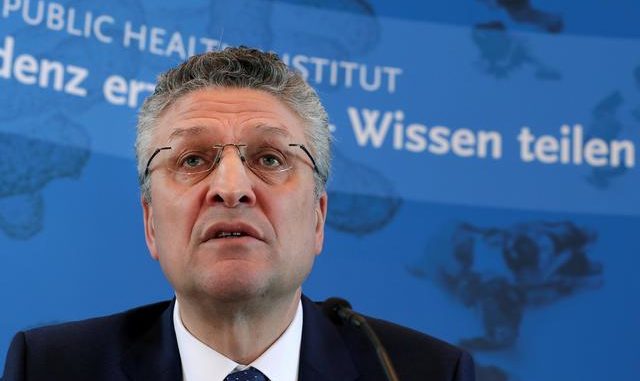
A lower number of new coronavirus cases in Germany in recent days is likely due to less testing over Easter and the outbreak is not yet contained, the head of the Robert Koch health institute said on Tuesday.Lothar H. Wieler, president of the Robert-Koch-Institute, addresses the media during a news conferenece on the current status of the coronavirus disease (COVID-19) spread, in Berlin, Germany, April 14, 2020. Michael Sohn/Pool via REUTERS
Germany’s number of confirmed coronavirus infections has risen by 2,082 to 125,098, data from the Robert Koch Institute showed earlier on Tuesday, marking the fourth daily decline in the number of new cases.
Reported deaths rose by 170 to 2,969. The death rate is far lower than among other countries most affected, but the German authorities remain wary of lifting restrictions on public life.
“We can’t speak of containment yet – we still have high numbers each day. We are seeing a slowdown,” Robert Koch Institute President Lothar Wieler told a regular news conference.
Urging Germans to wait and remain disciplined with social distancing measures, he estimated the virus reproduction or transmission rate, dubbed “R”, in Germany was about 1.2 – meaning a person with the virus infects 1.2 others on average.
“It is really in our interest that this R rate goes below 1, or is at 1. That is an important factor,” Wieler added.
In recommendations sent to Chancellor Angela Merkel and state governors on Monday, academics suggested public life may gradually return to normal if certain conditions are met including an infection rate stabilising at a low level.
Germany has closed schools, shops, restaurants, playgrounds and sports facilities, and many companies have shut to aid the fight against the coronavirus.
Merkel, who has said the position paper by the National Academy of Sciences Leopoldina will be important for her determination on the path forward, will discuss the recommendations with ministers on Tuesday.
On Wednesday, she will hold a video conference with the state premiers to discuss a possible path out of the lockdown and how to manage the recession it is expected to cause.
Economy Minister Peter Altmaier declined to name a date for the relaxation of restrictions.
“The next few days will bring clarity,” he said on breakfast television, adding that the government was keenly aware of the risks of lifting restrictions too early only to have to impose a full lockdown later.
“If the impression arises that there is to-ing and fro-ing, it would damage trust in politics and harm the peoples’ willingness to be disciplined and to cooperate,” Altmaier said. “We have to consider every step.”
Reporting by Paul Carrel and Madeline Chambers; Editing by Michelle Martin
BERLIN (Reuters) –
